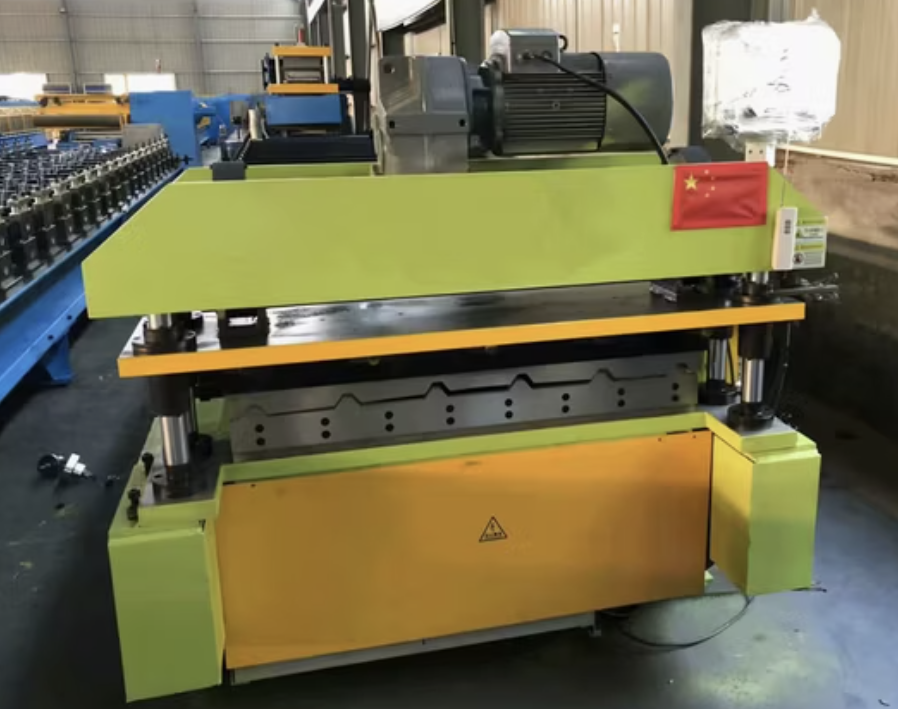To express an interest in this machine please submit the form below.

Not Sure What Machine You Need?
Select Your Profile, We'll Match It
Choose your desired profile drawing, and let Machine Matcher connect you with the best roll forming machine tailored to your needs.
Browse Profiles


A metal roof roll forming machine is a specialized piece of equipment designed to produce high-quality, custom metal roofing panels. These machines are essential in the construction industry, as they manufacture durable, weather-resistant metal roofing profiles used in both residential and commercial buildings. These machines offer precision, consistency, and efficiency, making them an integral part of modern roofing material production.
Metal roof roll forming machines are engineered to convert metal coils into customized roofing profiles. The machine uses a series of rollers, each designed to shape the metal progressively. Typically, the metal coil passes through these rollers to be shaped, cut, and finished according to the specified dimensions and designs. These machines are versatile and can be adjusted to produce various roofing panel types, including standing seam, ribbed, and corrugated profiles.
The machine is controlled by a PLC (Programmable Logic Controller) system, which allows for easy adjustments and precise control over the forming process. This automated control ensures consistent quality and accuracy in every panel.
Setting up a metal roof roll forming machine typically involves the following steps:
Q1: What types of profiles can a metal roof roll forming machine produce?
A: These machines can produce a variety of profiles, including standing seam, corrugated, ribbed, trapezoidal, and custom-designed panels. The flexibility of the machine depends on its design and the rollers included.
Q2: Can I customize the length of the metal roofing panels?
A: Yes, the PLC system allows you to set the length of the panels precisely, making it easy to customize according to project requirements.
Q3: What materials are compatible with metal roof roll forming machines?
A: Most machines are compatible with a range of materials, including galvanized steel, aluminum, copper, and pre-painted steel sheets. It’s essential to check the machine’s specifications for compatible material types and thicknesses.
Q4: How does the PLC system benefit the machine's operation?
A: The PLC system provides automated control, ensuring accurate dimensions, reducing waste, and increasing production efficiency. It also allows for easy adjustments to be made quickly, making the production process more adaptable.
Q5: How long does it take to set up the machine?
A: The setup time depends on the complexity of the profile and machine model, but generally, it takes between a few hours to a full day to complete the setup and calibration.
Q6: Is it possible to add additional features to the machine, like punching or embossing?
A: Yes, many models offer optional punching and embossing stations to add further customization to the roofing panels. These features can be installed based on specific requirements.
Q7: How can I ensure the machine’s longevity?
A: Regular maintenance, including cleaning, lubrication, and timely replacement of worn parts, will help extend the machine's life. Using high-quality materials and ensuring the hydraulic and electrical systems are properly managed also contributes to longevity.
Q8: What is the typical production speed of a metal roof roll forming machine?
A: Production speed can vary but typically ranges from 10 to 40 meters per minute. Faster speeds are achievable with advanced models and optimal settings.
Q9: What safety features are included in the machine?
A: Standard safety features include protective enclosures around moving parts, emergency stop buttons, and automated shutdown systems in case of malfunctions.
Q10: Is technical support available if there’s an issue with the machine?
A: Most manufacturers offer technical support for troubleshooting, maintenance guidance, and part replacements, often including remote assistance if the machine is equipped with a remote PLC system.
Copyright 2026 © Machine Matcher.